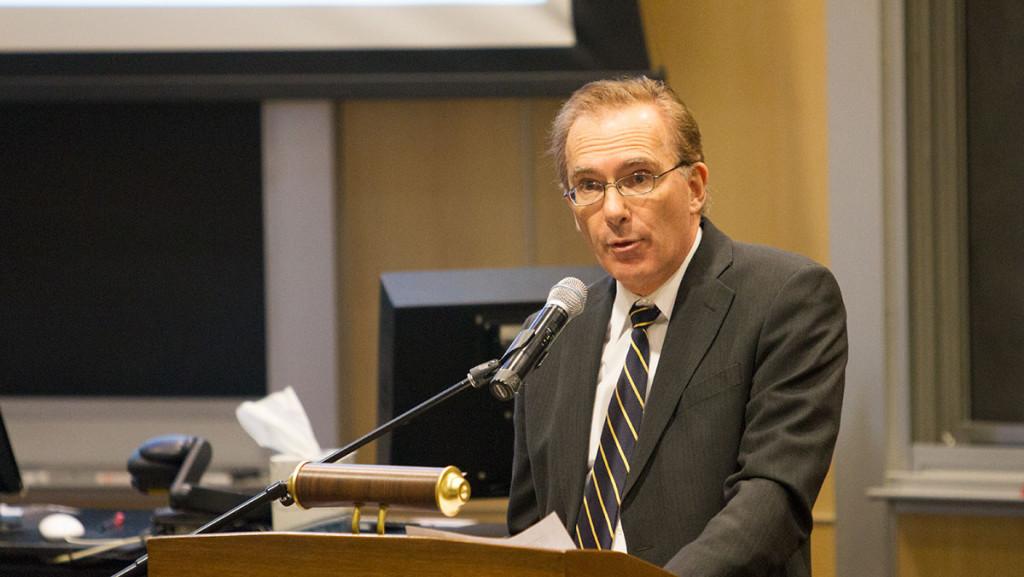Ithaca College President Tom Rochon has introduced his proposal for a ground-up revamping of the college to become a standard of excellence for comprehensive residential colleges.
Rochon spoke at a special all-college meeting March 5 regarding the college’s economic and structural future. He introduced the college’s “blue-sky” reimagination and spoke about a number of measures the college is considering with the hope of controlling costs.
The “blue-sky” reimagination of the college was described by Rochon as envisioning starting the college from scratch. Rochon said it differs from IC 20/20, which is the strategic planning process for the college’s future based on its current state, because it will not focus on how the college currently operates but instead on an ideal vision of the college.
Thomas Pfaff, professor of mathematics and director of the honors program, said he thought this blank-slate mentality was a good practice for the college to take part in.
“It’s a good idea to think ‘What are we doing here, and could we be doing it better?’” Pfaff said. “That doesn’t mean that anything is going to come from it, but it’s a good practice.”
Sophomore Gillian Wenzel said she attended Rochon’s speech because of the rising cost of tuition and what she described as a disregard for students with legitimate concerns. Wenzel said she thought Rochon wasn’t specific enough in the speech.
“I think Rochon was genuine with what he said,” Wenzel said. “But, I think he was very broad and included a lot of corporate buzzwords. It didn’t give me a clear picture of why my tuition rose.”
Wenzel said she was “hopeful, but skeptical” about Rochon’s reimagination plan, but she didn’t think Rochon had addressed past student concerns.
“I think the blank slate is a great idea, but I think there’s clearly something written on that slate by students, and that’s a Native American studies minor with tenured faculty,” Wenzel said. “That hasn’t been addressed by the college.”
Rochon’s proposed cost control measures included budgeting for an enrollment goal of 1,600 students in the upcoming academic year, instead of the usual target of 1,700. The college under-enrolled by 150 students last fall and is expecting to receive 1,700 fewer applicants for Fall 2015.
Rochon said he recognized fewer students would mean staff and faculty may have to be cut. In the past two years, the college has eliminated 36 staff positions, all of which were open or unfilled positions at the time, he said.
“In the future, not all eliminated positions will be open,” Rochon said.
Pfaff said he hopes the college will continue the practice of cutting staff positions by not filling positions as people retire.
“I would hope they wouldn’t have to begin the practice of actually cutting staff,” Pfaff said.
One of the primary goals of the college, Rochon said, is to diversify its sources of operating revenue. For the 2014–15 academic year, the college relied on student dollars for 86.4 percent of its revenue: 66.8 percent from net tuition and fees and 19.6 percent from room and board costs.
Rochon listed a number of steps to be taken as means to diversify revenue, including increasing the annual fund and endowment, generating additional revenue-producing uses of the campus during the summer, examining the potential of creating additional off-campus housing and looking into potentially developing an urban campus for graduate programs.
Wenzel said she thought creating additional off-campus housing was still utilizing student money as its primary source of revenue.
The speech’s major point was the college’s goal to maintain academic excellence while controlling costs. Pfaff said he agreed with Rochon’s stance on the broad points and understood why he didn’t get more specific.
“College’s don’t work like corporations,” Pfaff said. “They are collaborative in nature. [Rochon] can’t just go up there and say ‘This is what we’re going to do.’”
Students, faculty and staff can continue the conversation by emailing more questions to [email protected].








